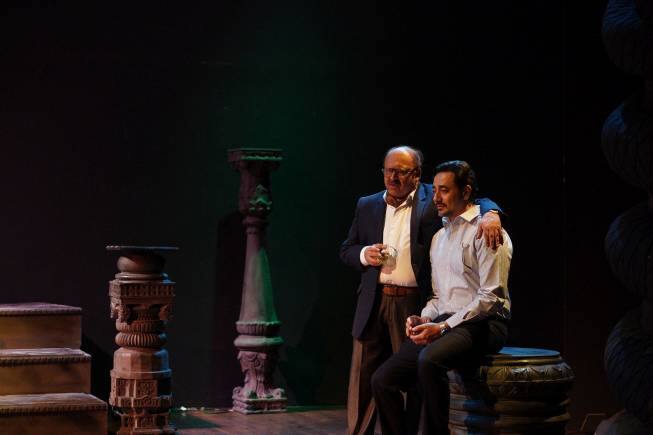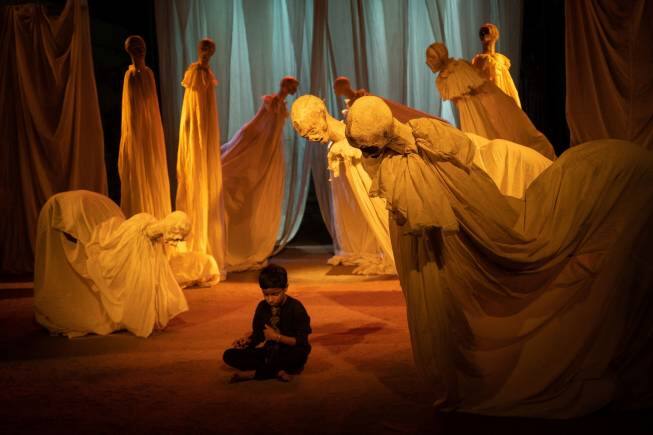



Ranga Shankara, founded in 2007, has quickly become one of India’s significant spaces for theatre. They have hosted and produced several plays, including the iconic Bikhre Bimb that was written by Girish Karnad. Every year, for 19 years now, the theatre hosts its annual Ranga Shankara Theatre Festival, presenting the finest of theatre in different styles, formats and languages. This year’s theme is JUST Theatre, and Arundhati Nag, artiste and artistic adviser of Ranga Shankara, talked about the theme, plays, new theatre directors, and storytelling.
Tell us about this year's theme - JUST: Let it out.The theme is looking at different meanings embedded in the word Just. It could be justice, fairness, or it could be the abundance of it or the absence of it. How do theatre people use this as the core idea to tell their stories?
So, we have six different storytellers from across the country showing their way of telling a story. It is not their story but they are telling different stories in their style. I think that’s what theatre is all about – telling and retelling and retelling again and again.
Also read: November 2022: Theatre festivals, best cultural events in Delhi, Mumbai, Bengaluru
What are the connotations that the different plays are bringing?There is the Dakla Katha Devi Kavya in Kannada, written and directed by Lakshmana KP. It is the telling of mythology of marginalized peoples. We can see the stories of justice or injustice coming out of their mythologies.
Then there is a play called There is Something in the Water, which is based on Henrik Ibsen’s An enemy of the People. When a Bombay director Akarsh Khurana adapts it to Mumbai, you have today’s stories of garbage, landfills and people building their homes over catchment area, lakes and tanks. What could go wrong when man does not heed nature or man’s greed is so great that he does not care about the life ahead?
 Still from the play 'There's Something in the Water', directed by Akarsh Khurana.
Still from the play 'There's Something in the Water', directed by Akarsh Khurana.We have Taking Sides which is a very famous and important play that questions and examines the age-old question that has bothered theatre people and intelligent people all along history. The question is who sponsors art and whose side is art on? Should art even bother who is funding it or who is watching it or who is consuming it? Or is it the prerogative of the artist to just create and not worry about which murderer funded his art (laughs) or whom is he talking to. I guess these are extremely important questions that many of us have to answer, even in real life.
Another play in Tamil, Idakini Kathaiaratham, is written and directed by S. Murugaboopathy, who is my favourite director. He comes from Tamil Nadu and he does theatre only in Tamil. His theatre is very visceral theatre with the real boys from the villages around there whom he has trained in the modern techniques of theatre. His language is so visual and he revisits what many of us have forgotten and are trying to put the lid on; like the aftermath of Covid or the aftermath of demonetization and how it affected the working-class people who had to walk home because the city does not welcome them if they are not working. We have forgotten them and we have not taken stock if they have gotten back on their feet. Murugaboopathy will remind us what we all, as citizens of urban India, must take cognizance of.
 Still from Tamil play 'Idakini Kathaiaratham', written and directed by S. Murugaboopathy.
Still from Tamil play 'Idakini Kathaiaratham', written and directed by S. Murugaboopathy.Then there is the famous 1984 by George Orwell with the catchphrase "Big brother is watching you". I guess my generation was very excited because it was the story of the future. 1984 was a long time ago, but surveillance still exists, spying on one another still exists, we don’t know who has our bank account number, we don’t know who is listening to our conversations, so big brother is still watching you. I am interested in what this young troupe from New Delhi, Unicorn Actors Studio, is showing us. It is important because it reveals what it means for this young generation to have big brother watching. I am curious.
Last is Ranga Shankara’s production, Apne Ghar Jaisa, which means like your own home. It is directed by Anmol Vellani and is important to both me and Surendranath, who have put this festival together, because it has a theme not often dealt with. It is in the grey area, it is subtle, it is not about black and white and yet, it is about how the middle class can believe or be swayed or has such strong beliefs on which side of certain political or secular convictions it hails from. This is about a simple middle-class homeowner waiting for a tenant to come to her house, and about her conversations and her ramblings. The play deals with ideologies very subtly and it is important for us to look at ourselves and examine how we think, what do we think of others and if we ever evaluate ourselves. I think there is enough food for thought in this festival and that’s what festivals are for.
But the festival is more than plays, right?I am very excited about the ancillary programmes because just anyone can do a theatre festival. Put some plays together and tie them up thematically if they have little application, I won’t say brains (laughs). It is important to see what else happens during the festival, otherwise a six-day festival can come and go. What is its impact, whom is it talking to and so on.
We are excited about college students who are coming and enacting 20-minute skits on each day of the festival before the main programme begins. Besides, the kids who will be performing are given tickets for the play of the day. I guess we will open a conversation and talk to them about their ideas of justice and what they saw and hope to continue this relationship with college students. And hopefully, going forward, they will be coming and performing different pieces at Ranga Shankara.
This year, thespian Ratna Pathak Shah is going to read stories in our segment called Other Voices. This would be storytelling for adults and she will be reading stories in Hindi, from Hindustan Chod by Ismath Chugtai and from English. We are calling it Parables for the Present and will be for an intimate audience after which there will be discussions. We are always trying to find answers for the various situations we find ourselves.
This year will be the eighth year of the Shankar Nag Award. Tell us more about the award and this year’s recipients.The Shankar Nag Award is given to a young theatre practitioner in Shankar’s memory. For the last eight years we have been looking for someone who has developed their own style and has lot of miles in them to go on. More than actually just collecting accolades for himself or herself, the person’s work has to be impacting the theatre field in India.
Shankar was also young when he left, he was just 36 but he had already finished making Malgudi Days, directed so many movies and acted in about 100 movies. Yet, he never stopped doing theatre and in spite of being a famous matinee idol, he continued to do theatre. This is what differentiated him from the rest.
The award is actually seeking people who have that kind of spark and are making Indian theatre so much richer. M.S. Sathyu, one of our most revered theatre directors, set designers and filmmakers is giving the award. He has held my hand through the construction of Ranga Shankara and is my guru. When I grow up, I want to be like him (laughs).
This year the award will be given to two women. One is Sharanya Ramprakash and the other is Nimi Raphel, both of them have shown great promise. Sharanya has branched off from the very run-of-the-mill, popular English theatre to creating her own piece called Akshaya Ambara which is on the theatre politics of Yakshagana. Nimi Raphel is a traditional Mohiniyattam dancer and a fine mizhavu player which is a 2000-year-old percussion instrument from Kerala. She is one of the inheritors of Veenapani Chawla’s Adishakti laboratory and is running it. It speaks volumes for her capacity to taken on responsibility and continue to be creative.
As a veteran in theatre, what are your insights on good storytelling?I think we have some very good storytellers, who have already established as theatre playwrights. Theatre is the art of telling a story in different ways, it is the developed art of storytelling as opposed to me sitting in front of you and saying ‘Once upon a time’. Theatre opens it all out for its audiences. Shakespeare is a great storyteller and so is Girish Karnad. Now, we are having some new storytellers who are shifting from linear narratives. They are not stuck in the format of a beginning, middle and the end of a story. Those kinds of shifts are challenging for the audience which is lazy and has got used to being spoon-fed. I am excited when that happens although that doesn’t necessarily become popular. Still, I am happy that people are experimenting with time for when you shift from the linear narrative, it means you are playing with time. That is a sign that you are playing with a new vision, a new way of looking at theatre and a certain modern maturity is stepping in.
Discover the latest Business News, Sensex, and Nifty updates. Obtain Personal Finance insights, tax queries, and expert opinions on Moneycontrol or download the Moneycontrol App to stay updated!
Find the best of Al News in one place, specially curated for you every weekend.
Stay on top of the latest tech trends and biggest startup news.